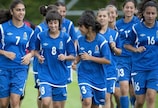Taking women's football forward
Monday, November 21, 2011
Article summary
Taking women's domestic football to a higher level and bringing together associations and clubs to drive this development were central themes of a UEFA KISS workshop in Nyon.
Article top media content

Article body
UEFA continues to give fresh impetus to the development of women's football throughout Europe – with the latest workshop under the European body's Knowledge & Information Sharing Scenario (KISS) especially looking at ways of boosting women's domestic football and taking it to a higher level.
The women's football week at UEFA, which included draws for the quarter-finals and semi-finals of the UEFA Women's Champions League and UEFA European Women's Under-17 and U19 Championship qualifying, not only brought together representatives from leading UEFA member national associations in women's football, but also gave the eight clubs involved in this season's quarter-finals the chance to give vital input to the discussions.
The objective of the workshop was clear. The club game serves as the basis for women's football development in Europe, and delegates debated how national associations' top women's domestic leagues can be supported and nurtured with a view to further progress. The KISS programme forms part of the HatTrick assistance scheme, under which UEFA provides invaluable support to help associations develop on and off the field.
"It is important for the top-tier national associations and clubs to meet and share views on how to bring women's football to the next level in Europe," said Karen Espelund, member by invitation to the UEFA Executive Committee. Various tools were proposed at the workshop as a means of stimulating quality – efficient licensing measures and appropriate funding being just two examples.
Minimum requirements are being worked out for three development stages. Criteria such as governance, marketing and sporting matters are being broken down into "must haves" and "nice to haves" for three development tiers – the leading national associations in women's football, associations in the next rank down who aspire to higher goals, and associations in the early stages of development. Certain elements, the workshop heard, can be implemented now, while targets should be defined under a determined set of minimum requirements for implementation by 2016.
UEFA's approach to club development, which is a key feature of the women's football development strategy, should be centred on the perspective held by the clubs and leagues, said Espelund. "UEFA's role is to bring their current and future outlook in line with the strategy and assist the national associations in the strengthening of their club structures.
"This UEFA KISS workshop has offered the national associations a platform to work together and start to create a pathway for club development in Europe," she added.
Three national associations – England, Finland and Germany – made presentations at the event. The English Football Association (FA) highlighted the success of the FA Women's Super League in driving club and women's football development and raising standards. The Football Association of Finland (SPL-FBF) showed how the visions and strategies built over many years had made football the most popular women's team sport in the country with 26,000 registered players and 300 clubs. The German Football Association (DFB) – undoubtedly a benchmark country in women's football – explained, among other things, about the need for a vision, clear targets and effective concepts to help bring the women's game forward.
The meeting of clubs and associations in Nyon was warmly welcomed. "It's a very good idea to have clubs and associations together – it's fantastic to learn from other countries how they develop things, and we in Germany also take a lot of ideas from other countries," said Heike Ullrich, head of the DFB's women's and girls' football department.
"I hope everyone will can see how important it is to build strong clubs," added Sweden's Susanne Erlandsson, first vice-chairwoman of the UEFA Women's Football Committee. "If you have strong clubs, you can have a good situation for young players to play in. I hope also the associations are aware of the importance of building strong leagues and strong clubs. Here in Europe, we build everything on clubs. We will have club licensing, so that we make sure the environment for the players, the coaches and the marketing people is good in the clubs – otherwise we couldn't reach the next level."








